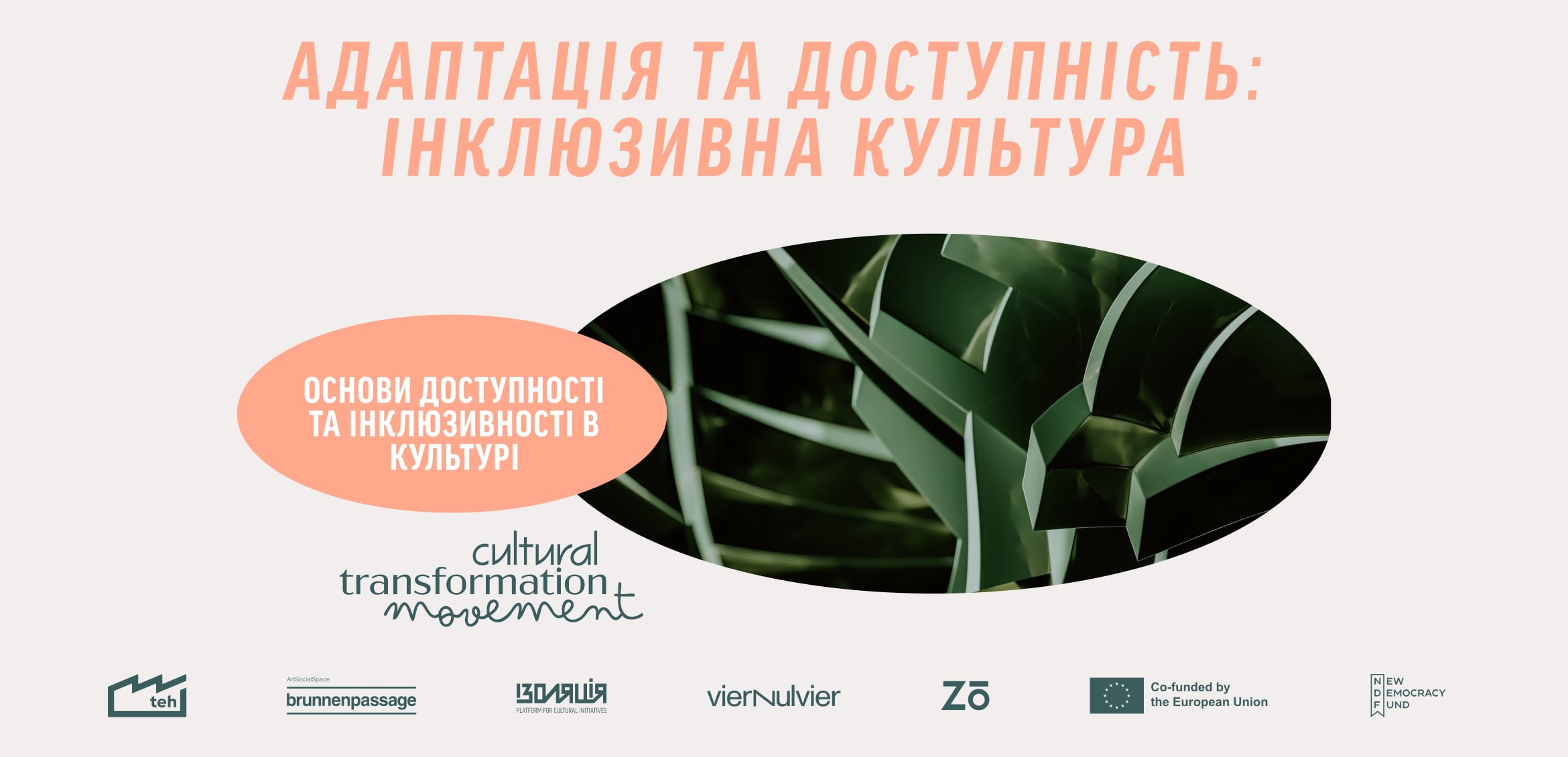"Adaptation and Accessibility: Inclusive Culture" workshop series

In 2024, IZOLYATSIA will host a series of workshops on accessibility and inclusivity in the work of cultural organisations in the frames of Cultural Transformation Movement Project (CTMP)
A total of four meetings will be held. Each event will cover a different aspect of this important topic, helping cultural and community organisations to improve their programmes and infrastructure for people with disabilities.
Participants of the workshop series will have the opportunity to apply for support for inclusive micro-projects up to €1,000 if they attend all 4 meetings.
Register to participate in the series →
"Basics of accessibility and inclusiveness"
The first event in the series of workshops on adaptation and accessibility is dedicated to a general discussion about the experience of people with disabilities and the challenges society faces in the context of inclusion.
Date: 28.05.2024, 17:00
Aim: Introduction to the fundamental concepts of accessibility and inclusivity. The event is dedicated to the importance of adapting the cultural programme and infrastructure for people with disabilities.
Topics:
- Challenges that exist in the context of inclusiveness;
- A brief theory on terminology and the correct use of inclusive vocabulary;
- Discussion of the importance of this topic for Ukrainian organisations working in Ukraine today;
- Discussion about the system of support and adaptation that currently exists in Ukraine and how it can be improved with the help of cultural organisations.
The speaker is Natalia Parkhytko, an activist of the NGO Dostupno.UA. The project focuses on the lives of people with disabilities and debunking myths about them.
"Physical accessibility in cultural spaces and events"
The second meeting will be devoted to an in-depth understanding of physical barrier-free accessibility in cultural spaces, as well as its importance in the context of inclusion of people with disabilities.
Date: 11.06.2024, 17:00
Aim: to equip organisations with practical knowledge and strategies to improve physical accessibility in cultural institutions and events, focusing on budgetary solutions and successful case studies.
The event will also include a presentation of successful examples of involving people with disabilities in cultural spaces and events, as well as group work for participants to analyse the accessibility of their space or event according to basic inclusion standards.
Speaker is Natalia Parkhytko, an activist of the NGO Dostupno.UA. The project focuses on the lives of people with disabilities and debunking myths about them.
“Inclusive planning to increase the participation of people with disabilities in cultural events”
The third workshop will focus on the importance of inclusive planning that takes into account the diverse needs of people with disabilities.
Date: 25.06.2024.
Aim: explore strategies for creating inclusive cultural programmes and events, and analyse successful examples of other organisations.
“Strategies and planning for organisational change for better adaptation and inclusion of people with disabilities”
The fourth event will focus on analysing planning strategies and organisational transformations to improve the adaptation and inclusion of people with disabilities. The meeting will include practical activities for the programme participants.
Date: 02.07.2024, 17:00
Aim: help the participants refine an action plan to implement small but effective changes in their organisations, building on practices and ideas from previous sessions.
At the end of the event, all previous workshops will be summarised.
“Practices of Inclusivity and Sensory Engagement in Cultural Spaces”
During the webinar, we will explore inclusivity in the cultural sphere from the perspective of openness to diverse audiences and adaptation, which includes both physical and social accessibility. We will focus on practices for creating environments that foster interaction with artistic and cultural content, engaging audiences with varied experiences. We will also discuss the use of different sensory images (tactile, auditory, visual metaphors, and scents) that enhance empathy and promote mutual understanding. We will examine shared elements across various audiovisual forms of expression in cultural spaces and explore their impact on contemporary culture. Part of the webinar will be dedicated to inclusive design and participatory art.
Variable Name — a Ukrainian artistic and curatorial group led by Valeria Karpan and Marina Marynichenko. They primarily work together in the field of participatory art and informal education. The group’s activities focus on processes of communication and exchange in urban environments, inclusivity, practices of commemoration, memory representation, and local narratives.
Date: 18.11.2024, 17:00
The Cultural Transformation Movement Project (CTMP) is a four-year project aimed at transforming cultural organisations by implementing cultural management strategies and methodologies and creative processes developed with the full involvement of underrepresented communities.
The project is funded by the European Union's Creative Europe programme. Pilot mini-projects are implemented with the support of the New Democracy Fund.